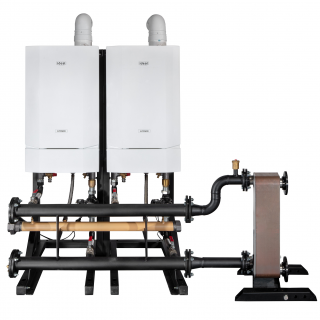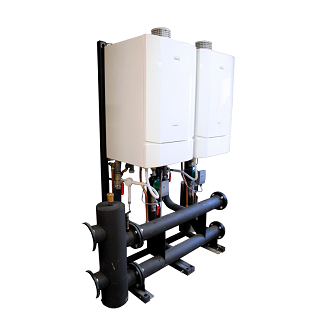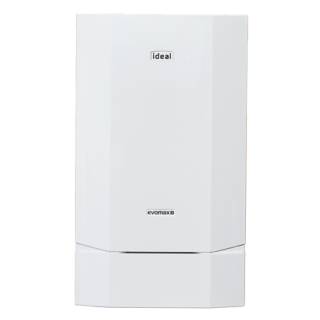Ideal Heating Commercial gas boilers are designed to be highly efficient. Our market-leading condensing appliances efficiently converts fuel to thermal energy for a reduced burner ‘on-time’ per kW heat delivered. This, in turn, means lower emissions of both CO2 and NOx.
Like nearly all mechanical devices, including gas boilers, how you use and maintain them and the overall heating system will have an impact on operation. Here we provide eight tips to help maximise the efficiency of your commercial boiler.
1.Keep the heating system clean
Heating systems can become contaminated with debris and dirt over the years, which may impact boiler efficiency, lead to boiler breakdowns and reduce its working life. Best practice, especially when installing new boilers onto an old system, is to completely separate the systems, preventing that ‘dirty’ system water from circulating through the new boiler. This can be achieved through using plate heat exchangers. On the secondary side of the system, you can use filters or strainers, or air and dirt separators to assist with removal of harmful debris in the system, which will help improve heat transfer within the secondary system. Alternatively, you can also consider Low Loss Headers and Magnetic Low Loss Headers which, although not offering complete separation, can be coupled with the secondary devices previously mentioned to ensure a clean and efficient system.
2.Treat the water
The formation of limescale in boilers or in system pipework can lead to poor heat transfer, hot spots in boiler heat exchangers and increased pressure losses in the system. Limescale can also become detached leading to debris in the flow which can lead to further blockages. Similarly, corrosion in the system can lead to increased levels of debris and premature failure of affected parts. To minimise the formation of limescale and corrosion, follow industry leading guidance as available in CIBSE guides or ICOM Commercial Water Treatment Guide. Water treatments specialists can advise appropriate products and maintenance regimes.
3.Insulation of commercial systems
Insulation prevents inefficient heat loss from the plant and distribution system. By ensuring all pipes and distribution equipment connected to the system that the boiler heats are properly insulated, heat is retained within the distribution system, to ensure the energy generated reaches its point of use at the optimum temperature. Use of preformed insulation kits for plant and equipment will not only maximise efficiency of the equipment, but minimise installation time as well.
4.Evacuate all air from the heating system
Air trapped in a heating system can lead to uneven heat distribution and poor performance of heat emitters, forcing the boiler to work harder to maintain the desired temperature in the building. To avoid this, bleed the emitters on a wet heating system. Also, install automatic air vents at the highest points of the heating system, such as on top of boilers or in risers, to effectively remove trapped air.
5.Maintain the boiler regularly
Regular maintenance is essential to ensure the smooth and efficient running of a commercial boiler and, in some cases, it is a building insurance requirement. Boilers should be serviced at least once a year by a qualified gas safe engineer. The service may include cleaning the boiler, checking for any potential issues, and ensuring all components are working correctly.
6.Fit time and temperature controls
If they aren’t already in place, install a heating control system that allows time and temperature control of the heat input of the boiler so the system is only being heated when it is required. Also, consider the use of room sensors that will ensure correct comfort temperatures in occupied spaces, and an external air sensor to allow for weather compensated operation of the heating system.
7.Consider an energy management system
Including a boiler or cascade of boilers in an energy management system may allow for energy usage to be more accurately monitored and controlled, for maximum efficiency.
8.Invest in training
If you manage a building then train the maintenance staff on how to operate the boilers and the heating system efficiently. This should include how to adjust settings, identify potential issues, and perform basic maintenance tasks. Well-trained staff can help prevent unnecessary energy wastage and keep the boiler and heating system running smoothly. Ideal Heating Commercial offers a full range of commercial product training courses; book here.
With high energy prices and a focus on reducing our carbon footprint, getting the maximum efficiency from a commercial boiler by following these eight steps makes good business sense.
To find out more about maximising the efficiency of a commercial boiler speak to your local business development manager.




